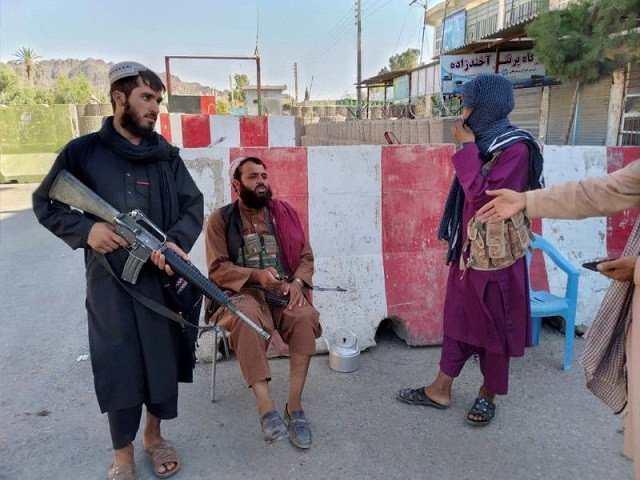Two Afghan officials said President Ashraf Ghani has left the country. The officials, one from former President Hamid Karzai's office and another an aide on the Afghan security council, told The Associated Press that Ghani left Sunday. The officials spoke on condition of anonymity because they weren't authorized to brief journalists.
Sources told CNN-News18 that Afghanistan president Ashraf Ghani has resigned on Sunday and a new interim government is set to take over soon. However, the Taliban has not taken formal control.Amid an unprecedented increase in the level of violence in the country, acting Defence Minister Gen Bismillah Mohammadi Sunday said that security forces are committed to defend Kabul from the Taliban.
According to News18, the Taliban fighters on Sunday said a safe passage will be given to Afghanistan government officials, including Ashraf Ghani and Amrullah Saleh, the first vice president of Afghanistan.Former Afghan Interior Minister Ali Ahmad Jalali is poised to take over the transitional government in Afghanistan, Reuters has reported. Jalali was born in Kabul but was a US citizen since 1987 and resides in Maryland in the US.
Afghanistan president is expected to announce his resignation soon, sources closed to the president told News18. Earlier, the interim minister had said that according to their agreement with Taliban, the regime will be handed over to a transitional third-party government.
Taliban negotiators are heading to the presidential palace to prepare for a "transfer" of power.The official, who spoke on condition of anonymity because of fear of reprisals, said Sunday that the goal was a peaceful handing over of the government to the Taliban.
A Taliban leader in Doha, which has been the site of years-long peace negotiations between the Afghan government and the group, said fighters on Sunday were ordered to refrain from violence and offer safe passage to those wishing to leave Kabul.
A spokesman for the Taliban has confirmed that the militant group will not take the capital Kabul by force. Its fighters have been instructed to stay at the gates of Kabul until a peaceful transition takes place.The Taliban entered Kabul on Sunday morning and was set to seize power in a lightning offensive in Afghanistan, CNN-News18 reported, as residents in the war-torn country stared at a bleak future with the withdrawal of US and Nato troops.
Kabul was the last stand of the democratic government of President Ashraf Ghani. All other major cities surrendering before the insurgents who ruled the country from 1996 to 2001 with an iron fist.Though Ghani said on Saturday consultations were on "inside the government with elders and political leaders, representatives of different levels of the community as well as our international allies", experts feared that the Taliban would not go for any power-sharing agreement, especially in the backdrop of its military successes.
Hours before the Taliban entered Kabul, the US Embassy began evacuating its staff even as President Joe Biden asked the insurgents not to threaten that mission. Helicopters began landing at the US Embassy and rapid shuttle-run flights near the site began. DIplomatic armoured SUVs could be seen leaving the area as officials destroyed sensitive documents.
Thousands of civilians now live in parks and open spaces in Kabul itself. Some ATMs stopped distributing cash as hundreds gathered in front of private banks, trying to withdraw their life savings.Though the Taliban assured citizens that "it will, as always, protect their life, property and honor", there was a rush to exit the country through the Kabul airport among those who could. There have been reports of targeted killings of civilians from areas captured by the Taliban, known to undermine civil liberties and human rights.
In a military blitzkrieg over the past two weeks, the Taliban has captured all major cities from Mazar-i-Sharif in the north to Kandahar in the south and from Herat in the west to Ghazni in the east.
Many Afghans fear a return to the Taliban's oppressive rule. The group had previously governed Afghanistan under a harsh version of Islamic law in which women were forbidden to work or attend school, and could not leave their homes without a male relative accompanying them.
The Taliban, pushed to a corner after the US entered Afghanistan as part of its campaign against terrorism in 2001, have regrouped over the past few years and launched a swift offensive with Washington setting in motion the final phase of its troops pullout on 1 May. The Taliban's major territorial gains have come since the first week of August.
The US, which once ended the Taliban reign (1996-2001) and singled out the group for harbouring al Qaeda terrorists following the 9/11 attacks, has stuck to its decision to withdraw from the country after two decades of war by 11 September. President Biden maintains that Afghan forces and government should be able to defend their country.
As the country plunged into chaos, the unravelling of Afghan security forces, trained by the US for years, has been spectacular. The combined strength of the Afghan army, air force and police stood at over 300,000 on paper. But there have been reports that the forces have been plagued by corruption and desertion.
The Taliban has defeated, co-opted or sent Afghan security forces --- suffering from mismanagement and corruption --- fleeing from wide swathes of the country, even with some air support by the US.
According to some estimates, the Taliban have a core group of 60,000-75,000 soldiers, with the backing of another 100,000-150,000 militiamen and sympathisers. The group gets a large chunk of its funds from the drugs trade - and is also supported by external forces such as Pakistan. In the recent fighting, the Taliban have seized military assets, including Humvees and machine guns, from the retreating Afghan forces.
































